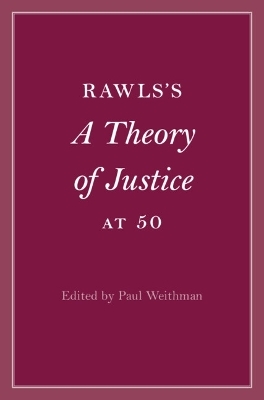
Rawls’s A Theory of Justice at 50
Cambridge University Press (Verlag)
978-1-009-21469-8 (ISBN)
In 1971 John Rawls's A Theory of Justice transformed twentieth-century political philosophy, and it ranks among the most influential works in the history of the subject. This volume of new essays marks the 50th anniversary of its publication with a multi-faceted exploration of Rawls's most important book. A team of distinguished contributors reflects on Rawls's achievement in essays on his relationship to modern political philosophy and 20th-century economic theory, on his Kantianism, on his transition to political liberalism, on his account of public reason and contemporary challenges to it, on his theory's implications for problems of racial justice, on democracy and its fragility, and on Rawls's enduring legacy. The volume will be valuable for students and scholars working in moral and political philosophy, political theory, legal theory, and religious ethics.
Paul Weithman is the Glynn Family Honors Professor of Philosophy at the University of Notre Dame. He is the author of Religion and the Obligations of Citizenship (Cambridge, 2002), Rawls, Political Liberalism and Reasonable Faith (Cambridge, 2016), and Why Political Liberalism? (2010).
Part I. Rawls and History: 1. 'Taillight illumination: how Rawlsian concepts may improve understanding of Hobbes's political philosophy' S. A. Lloyd; 2. 'The theory Rawls, the 1844 Marx, and the market' Daniel Brudney; 3. 'Rawls, Lerner, and the tax-and-spend booby trap: what happened to monetary policy?' Aaron James; 4. 'Rawls's principles of justice as a transcendence of class warfare' Elizabeth Anderson; 5. 'The significance of injustice' Peter de Marneffe; Part II. Developments between A Theory of Justice and Political Liberalism: 6. 'On being a 'self-originating source of valid claims' Stephen Darwall; 7. ' Moral independence revisited: a note on the development of Rawls's thought from 1977–1980 and beyond' Samuel Scheffler; 8. 'The method of insulation: on the development of Rawls's thought after a theory of justice' Rainer Forst; 9. 'The stability or fragility of justice' Japa Pallikkathayil; Part III. Rawls, Ideal Theory and the Persistence of Injustice: 10. 'The circumstances of justice' Erin I. Kelly; 11. 'Why Rawls's ideal theory leaves the well-ordered society vulnerable to structural oppression' Henry S. Richardson; 12. 'Race, reparations, and justice as fairness' Tommie Shelby; 13. ' On the role of the original position in Rawls's theory: reassessing the 'idealization' and 'fact-sensitivity' critiques' Laura Valentini; Part IV. Pluralism, Democracy and the Future of Justice as Fairness: 14. 'Public reason at fifty' Kevin Vallier; 15. 'Reasonable political conceptions and the well-ordered liberal society' Samuel Freeman; 16. 'Religious pluralism and social unions' Paul Weithman; 17. 'One Person, at least one vote? Rawls on political equality…within limits' David Estlund; 18. 'Reflections on democracy's fragility' Joshua Cohen; 19. 'A society of self-respect' Leif Wenar; Bibliography; Index.
| Erscheinungsdatum | 01.08.2023 |
|---|---|
| Reihe/Serie | Cambridge Philosophical Anniversaries |
| Zusatzinfo | Worked examples or Exercises |
| Verlagsort | Cambridge |
| Sprache | englisch |
| Themenwelt | Geisteswissenschaften ► Philosophie |
| Recht / Steuern ► Allgemeines / Lexika | |
| Recht / Steuern ► EU / Internationales Recht | |
| Sozialwissenschaften ► Politik / Verwaltung ► Politische Theorie | |
| ISBN-10 | 1-009-21469-1 / 1009214691 |
| ISBN-13 | 978-1-009-21469-8 / 9781009214698 |
| Zustand | Neuware |
| Haben Sie eine Frage zum Produkt? |
aus dem Bereich


